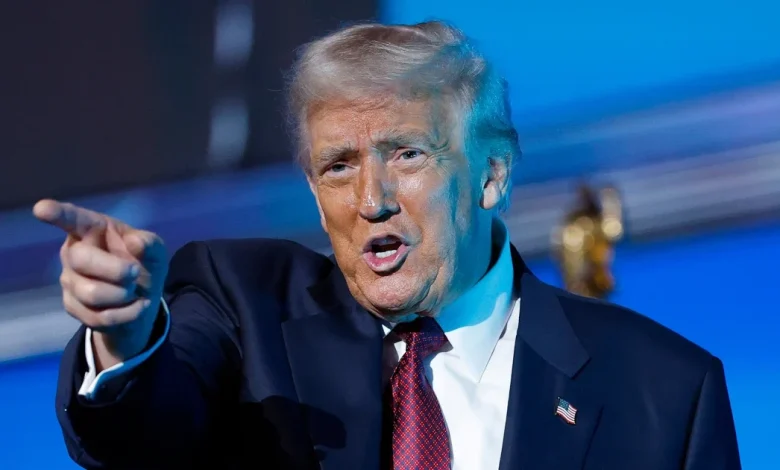Trump promises of direct checks test his economic message

President Donald Trump is stuck on an idea: sending checks to Americans.
A $2,000 “dividend” check using revenue from his global tariffs campaign. A “DOGE savings” payment using 20% of the proceeds from Elon Musk’s budget-cutting initiative. A health care plan that would funnel money away from Affordable Care Act insurance plans and direct it straight to Americans, who might be able to keep any “money left over.”
The White House has yet to release concrete plans on any of it, though press secretary Karoline Leavitt told reporters on Wednesday that the administration is “currently exploring all legal options” to issue the $2,000 tariff checks.
And that puts Trump’s Republicans in a dicey spot.
If direct checks are not issued, there’s a political threat if voters get their hopes up waiting for money they don’t receive. “If you make a promise that sounds good to people, and then it sort of just disappears — maybe they’ve not noticed that the first or the second time — but certainly, if you keep doing that, they do,” said Doug Heye, a Republican strategist.
But there’s potentially an even bigger risk if checks are issued: They would likely either drive up inflation or, if not, serve as an implicit acknowledgment that the fundamentals of the economy are weaker than White House has suggested.
In a strong economy with low unemployment and healthy consumer spending, adding more money to people’s pockets can add inflationary pressure — which could worsen Americans’ concerns about affordability and the cost of living. Stimulus payments are most effective in a recession or economic downturn with low inflation, high unemployment and weak consumer demand.
Right now, the labor market is showing signs of softening, but consumer spending has remained strong and inflation has cooled enough that the Federal Reserve has started to reduce interest rates.
“The economic situation we face today is not one in which you’d expect the policy response to be direct payments,” said Alex Jacquez, a former National Economic Council official under President Joe Biden. Jacquez defended rounds of stimulus checks by the Biden administration as “fairly standard” for a recession like the one caused by the coronavirus pandemic.
Instead, the recent pitches from the president nod at Republicans’ political reality. Exit polls from last week’s elections show that the cost of living remains a top priority for voters.
“To me, this just looks like this is an election ploy,” said Desmond Lachman, an economist at the conservative-leaning American Enterprise Institute. “He’s just seen that people are worried about affordability and they’re not making ends meet. So why don’t you just give them a check?”
The president plans to travel the country later this year and into 2026 to deliver speeches focused on the economy, according to a senior White House official, though the locations have yet to be decided. And despite the president publicly dismissing concerns about affordability, White House staffers have organized meetings to address the issue.
“I want the money to go directly to you, the people,” Trump told reporters on Wednesday night as he signed legislation to reopen the federal government. “So much money is involved, and we’re willing to pay so much money to the people.”
Still, Trump’s nascent proposals face an unclear path forward.
National Economic Council Director Kevin Hassett said Congress would need to pass legislation on tariff rebate checks. In July, Sen. Josh Hawley, R-Mo., introduced a bill to give families of four up to $2,400 from tariff revenue, and though Trump initially said he was thinking about such a proposal, the legislation has remained dormant ever since. Sen. Rick Scott, R-Fla., said this week he would draft legislation for direct payments to healthcare-specific accounts. A senior White House official told MSNBC the administration would have to see the bill before supporting it.
And then there’s the looming Supreme Court decision on Trump’s imposition of tariffs, which threatens to unravel his designs for the “dividend” checks. Without much of its tariff revenue, justifying the cost of rebate checks could prove untenable for Trump. The Committee for a Responsible Federal Budget estimates the proposal’s price tag would be roughly $600 billion, based on a model that excludes people who earn more than $75,000 a year. The government’s total annual income from tariffs amounts to approximately half that amount.
“President Trump remains committed to continuing to deliver on his Day One priority of turning around Joe Biden’s affordability crisis and dead-end economy,” White House spokesman Kush Desai said in a statement. “Self-proclaimed experts should hold on their half-baked analyses until the administration releases concrete policy proposals instead of baselessly speculating what the details of the president’s proposals are.”
Republicans and top administration officials continue to pummel Biden for leaving them with the tailwinds of record inflation. But as Trump has raised the prospect of injecting money into the U.S. economy, Republicans have mostly refrained from expressing worries it could contribute to higher prices.
The consumer price index is now at 3% growth on the year, as of September, and most economists blame supply-chain challenges as the primary driver of persistent inflation, though stimulus policies were likely a contributing factor. In addition to Biden’s stimulus payments, Trump approved stimulus checks of up to $1,200 per person in his first term at the height of the Covid crisis.
Underscoring why sending checks can leave a lasting impression: Even after Trump lost the 2020 presidential election, voters still recalled seeing his signature on pandemic-era stimulus checks. Biden, meanwhile, opted not to sign his name on subsequent slips, which some Democrats believed was a mistake.
I “learned something from Donald Trump; he signed checks for people,” Biden said last year. “I didn’t: stupid.”
This time, it’s unclear whether Trump’s vows on direct payments have permeated the public psyche. Searches for “2000 dollars trump” and “stimulus check 2025” skyrocketed this week, according to Google Trends. But Heye noted that the “sheer volume” of news under Trump means that “most people are not focused on the minute-by-minute” developments of his office.
“Trump knows that,” says Heye. “My guess is because we’ve seen this a million times; we’ll have forgotten about this rather quickly — unless he keeps bringing it up.”



